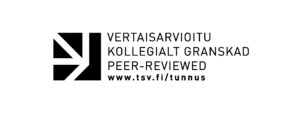Abstract
The development of the entrepreneurial mindset of students is a topic that is relevant from a practical perspective and actively discussed in research. The aim of this paper is to explore how students evaluate their entrepreneurial skills, which might be helpful to better understand the possibilities to promote the development of an entrepreneurial mindset amongst students. Drawing up on a self-assessment form developed by the Women’s Initiative for Self-Employment, we therefore conducted an empirical study among 39 students from 6 different countries. Our findings indicate that 92% of the surveyed students have at least satisfactory ability to become an entrepreneur, however, results differ between the nationalities. Moreover, we find self-confidence and willingness to take responsibility for his/her own successes and failures to be most strongly correlated with the ability to become an entrepreneur. We discuss implications for research and practice.
Keywords: Entrepreneurial Mindset, Skill Development, Students
1. Introduction and Theoretical Framework
The entrepreneurial mindset of students is an actively discussed topic from the theoretical and practical perspective. Students with a strong entrepreneurial motivation are often seen as one of the key factors for the long-term economic development in the market economy, with a material positive impact for the economic growth as well as for the sustainable social benefits system. As Rahayu and Fitriati (2013) stress, entrepreneurship as a paradigm and practices are increasingly important in today’s social and economic life. For this reason, various authors research the formation of entrepreneurial mindset of students and study how to form and improve it during study years.
This need is recognized not only for those who study business-related programs. For example, according to Li et al. (2016), the need for developing an entrepreneurial mindset in engineering students is being recognized by many universities, and such need for engineering entrepreneurship education has been well reported in the past two decades.
Gargouri and Naatus (2019) base the need for their study on the insights by Herrmann et al. (2008), where they stress one of the conclusions that academic faculties and students need to find innovative ways to appropriate entrepreneurship in their subject discipline. In their study Gargouri and Naatus (2019) conclude that entrepreneurial education has positive impact on students’ attitudes towards entrepreneurship education, therefore there is a benefit to incorporate innovative assignments and activities into entrepreneurship classes that would specifically help to develop entrepreneurial attitudes and an entrepreneurial mindset.
Rahayu and Fitriati (2013) considers that it is necessary to promote the interest or concern of the students to love and understand entrepreneurship. Authors suggest the model of development of creative industries, which is based on people as a foundation for five key pillars – industry, technology, resources, institution, and financial intermediary – linking intellectuals, business and government together. In this model the intellectual group is seen as an institution of higher education, which has knowledge of entrepreneurship and other supporting knowledge driving and facilitating the intellectual development of the creative industries actor. In this context, the higher degree of students’ entrepreneurial mindset directly is linked with the higher availability and quality of intellectual resources, which becomes driving force for the development of the country.
Guth (2016) stresses that producing a talented pipeline of entrepreneurs and business leaders should begin well before high education. This is linked with the fact that a number of characteristics of typical entrepreneur are individual character-related, thus should be developed from the very young age. According to Bock (2020), there are several common characteristics of an entrepreneur:
- Works hard,
- Wants financial success,
- Has family support,
- Is energetic,
- Has an internal ‘locus of control’,
- Takes risks,
- Sacrifices employment benefits,
- Has a need to achieve,
- Has business experience,
- Is independent,
- Has a self-employed parent as a role model,
- Has self-confidence,
- Has integrity,
- Has determination,
- Adapts to change,
- Has a good network of professionals.
The above characteristics are seen as common for any type of entrepreneur, but students might be more inclined in owning or developing some characteristics. One can presume that it is easier for students to sacrifice employment benefits when they do not have experience of long-lasting employment relations, thus are less likely to evaluate some benefits to full extent. For example, the use of even a basic unemployment benefit can be seen very differently by a first- or second-year student who still relies on the financial support from the family, and by a young married professional with a newborn.
On the other hand, business experience, independence or a wide network of professionals might be weak spots for students. Therefore, when discussing students’ inclination towards entrepreneurship, it is linked more to intra-personal characteristics like integrity and determination, and less to characteristics which are acquired due to professional experience.
To some extent, nearly all students in a modern education system are forced to develop at least basic entrepreneurial skills due to the need to compete amongst themselves for better grades, more popular classes and for better starting positions in a job market. As Rahayu and Fitriati (2013) emphasize, the development of entrepreneurial intention eventually also becomes the focus of government, business and academician, not only for the purpose of developing the economy, but also to provide learning among students and employees who are no longer able to see the opportunities and renewal.
It is easier to develop the mindset of entrepreneur for students while they are not bound to routine and habitual activities, and also are keen to adapt practically the skills and knowledge they just acquired.
However, those skills are not sufficient in the context of the aim to ensure that students consciously develop their entrepreneurial mindset. According to Rahayu and Fitriati (2013), the process of transformation of the student mindset change toward entrepreneurship is reached by six steps:
- knowledge development step;
- skill development step;
- guidance step toward self- confidence;
- corrective action and evaluation,
- increasing of the quantity and quality of the products;
- stabilization toward a new producer, with appropriately planned production.
Li et al (2016) proposes the model of Kern Entrepreneurial Engineering Network (KEEN), where twelve secondary entrepreneurial behaviors grouped into the following four categories:
- Engineering Thought and Action: Apply creative thinking to ambiguous problems; Apply systems thinking to complex problems; Evaluate technical feasibility and economic drivers; Examine societal and individual needs.
- Collaboration: Form and work in teams; Understand the motivations and perspectives of others.
- Communication: Convey engineering solutions in economic terms; Substantiate claims with data and facts.
- Character: Identify personal passions and a plan for professional development; Fulfill commitments in a timely manner; Discern and pursue ethical practices; Contribute to society as an active citizen.
According to Lindberg et al. (2017), the art of entrepreneurship should include the creative and innovative thinking, with elements of self-directed learning. In developing students’ entrepreneurial mindset, Lindberg et al. (2017) recommend an andragogic approach that encourages the students to be autonomous and trusting in their capabilities and actions, tolerant to ambiguity, as well as to their judgments.
The robust research of how students evaluate their entrepreneurial skills, as a first step in the process, is beneficial to better understand the possibilities to promote the development of entrepreneurial skills amongst students.
2. Empirical Study to Assess Students’ Evaluation of Their Entrepreneurial Skills
2.1 Methodology
Toomas More, University of Applied Sciences arranged the annual Winter Week on the topic of Service Design, in November 2019 in Lier, Belgium. There were professors from five different countries (Germany, Finland, the Netherlands, Lithuania and Poland) coaching the international group of 39 students. As a part of the program, students evaluated their entrepreneurial skills by filling in a Self-Assessment form developed by the Women´s Initiative for Self-Employment (Bock, 2020). All participating students filled in the self-assessment form, and thus the survey was conducted with the complete census method. There were 20 entrepreneurial statements in the quiz, which the students evaluated by Likert scale 1 – 5 (1 = strongly disagree, 2, 3 = somewhat agree, 4, 5 = strongly agree). Distribution of each variable is presented by relative stacked bars. In addition, the Likert scaled responses were summed up to create a total entrepreneurial ability score. The score values varied from 0 to 100. The interpretations of the sum scores were classified into four groups:
| Score | Assessment |
| 80 – 100 | You have outstanding ability to be an entrepreneur |
| 60 – 79 | You have satisfactory ability to be an entrepreneur |
| 40 – 59 | Self-employment may not be an appropriate career for you |
| 0 – 39 | You should probably avoid entrepreneurship |
Out of the sum score total and country based means, medians and standard deviations are introduced. Furthermore, nonparametric Spearman’s rank correlations were run in order to estimate how each Likert scale variable correlates with the total entrepreneurial ability score. In order to provide certainty, country based differences were also checked by non-parametric Kruskal-Wallis test.
The results are reported according to the characteristics of an entrepreneur, designed by the Women´s Initiative for Self-Employment. (Table 1)
| Characteristics of an Entrepreneur | Question number | Characteristics of an Entrepreneur | Question number |
| Hardworking and energetic | 1 & 8 | Business experience | 12 |
| Financial success | 6 | Independent | 5 & 9 |
| Family support | 2 | Self-employed parent as a role model | 14 |
| Internal self-control and self-confidence | 10, 15 & 18 | Integrity | 16 |
| Risk-taker | 3 | Determination | 17 |
| Sacrifice employment benefits | 4 | Adapting to change | 13 & 19 |
| Need to achieve | 7 & 11 | Good network of professionals | 20 |
In addition, the responses were summed up to create a score assessment variable. The score values varied from 0 to 100. The interpretations of the scores were classified into four groups:
| Score | Assessment |
| 80 – 100 | You have outstanding ability to be an entrepreneur |
| 60 – 79 | You have satisfactory ability to be an entrepreneur |
| 40 – 59 | Self-employment may not be an appropriate career for you |
| 0 – 39 | You should probably avoid entrepreneurship |
2.2 Respondents’ profile
The amount of female and male students were about the same. Students represented six different nationalities (Figure 1). Most of the students were business students specializing in finance, accounting, sales and communication, business engineering, creative management and office management. A significant number of students were Bachelor level students; only one represented the Master programme of Industrial engineering.
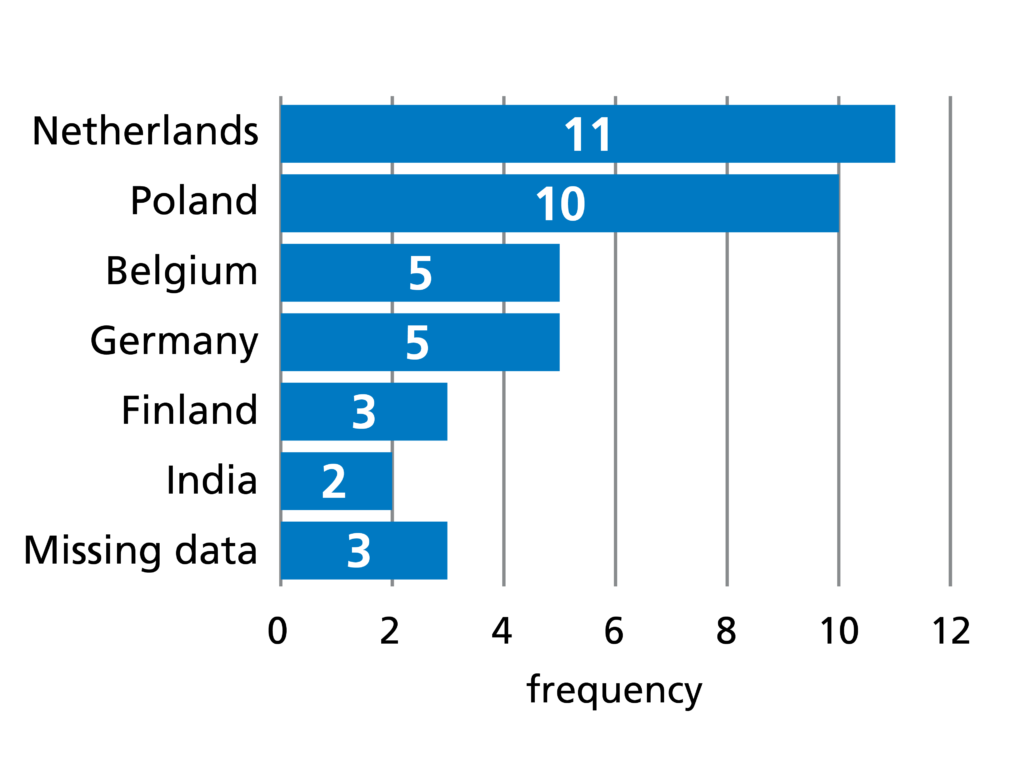
2.3 General findings
Hardworking and energetic
Over half of the students (54 %) had a positive attitude towards working 50 hours or more per week. On the other hand, one-fifth (21%) of the students was not willing to work so hard. The capability of maintaining the high energy level over a long time was valued very positively as 85 percent of the students at least somewhat agreed on the statement. (Figure 2)
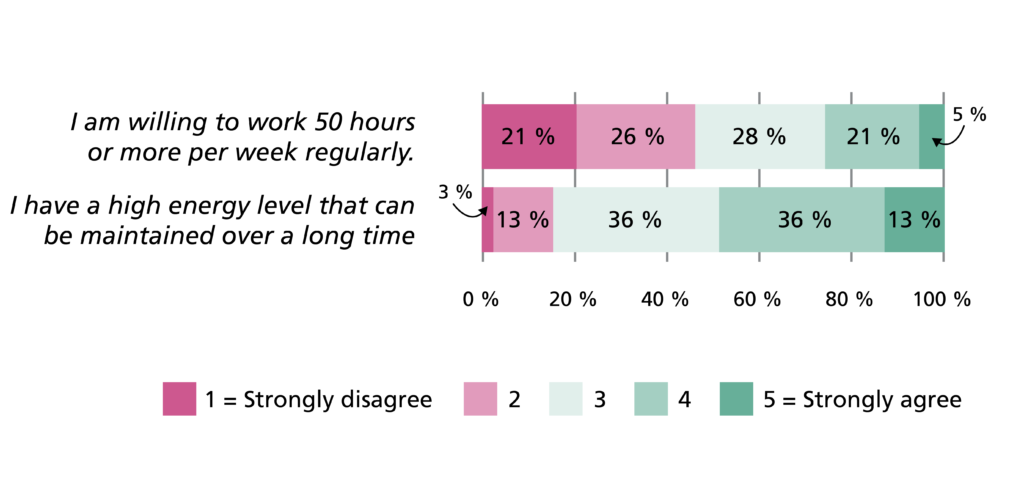
Financial success
Entrepreneurs want to pursue financial success through self-employment. Four out of five (80%) students estimated to gain more financial success by operating their own business. Only 8 percent of the students did not have the confidence to gain more financial success through self-employment. (Figure 3)
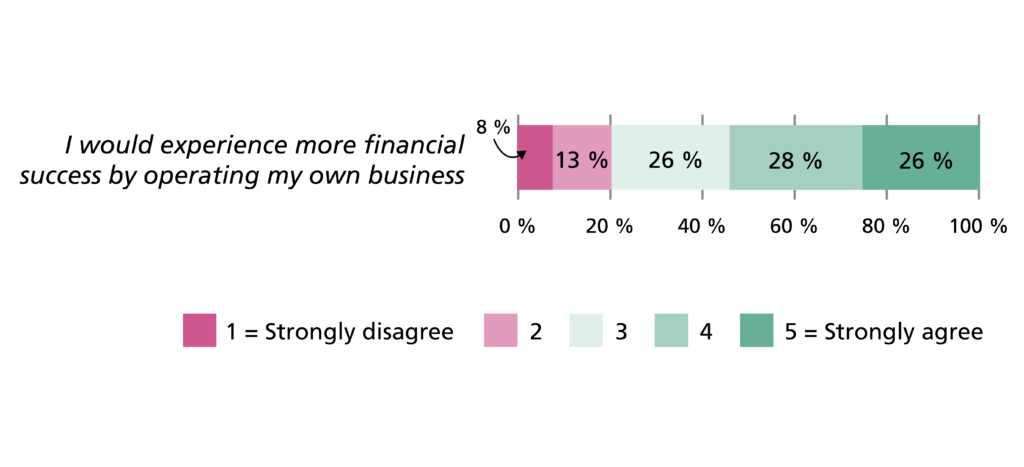
Family support
Entrepreneurs need a different kind of support and not least from their family. The support could be an encouragement, time, listening or money. Almost all (95 %) students experienced to get support from their family when going into business. Only 5 percent of the students did not agree on the statement “My family will support my going into business”. (Figure 4)
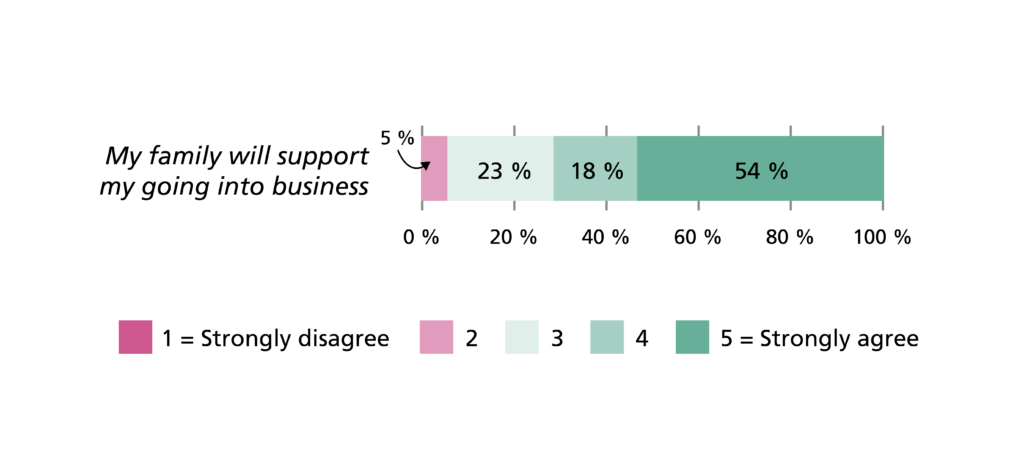
Has an internal self-control and self-confidence
Entrepreneurs want to take responsibility for their own success and failures and they do not want to blame other people of their failures. They also need good self-esteem and self-confidence especially in situations they experience challenges and difficulties. Over four out of five students (84%) believed that they are responsible for their own success and failure. Almost four out of five students (79%) felt that their abilities and skills are greater than those of most of their co-workers. (Figure 5)
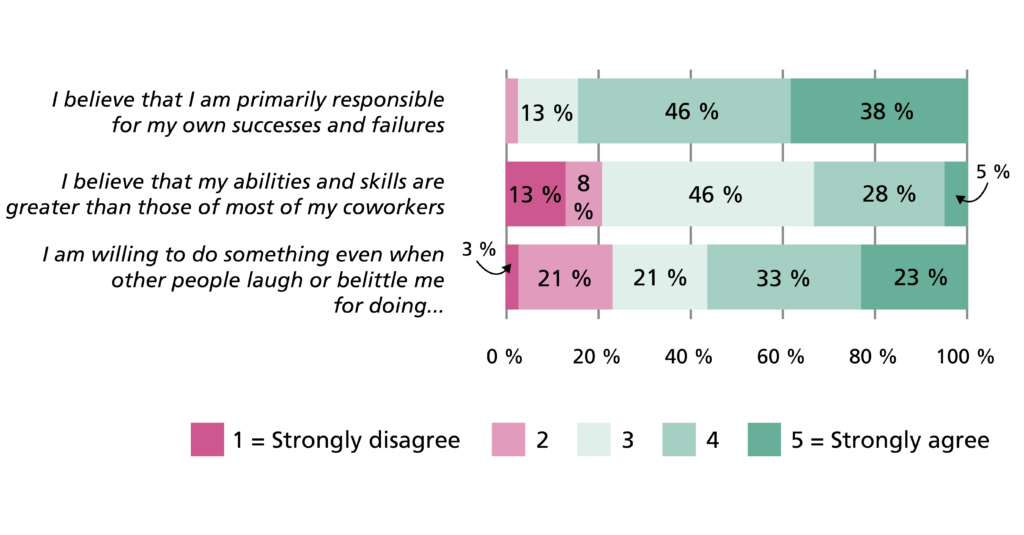
Takes risks
Entrepreneurs are willing to take many risks to succeed in their business such as career, time and financial. Almost 90 percent (87%) of the students accepted both financial and career risks when necessary. (Figure 6)
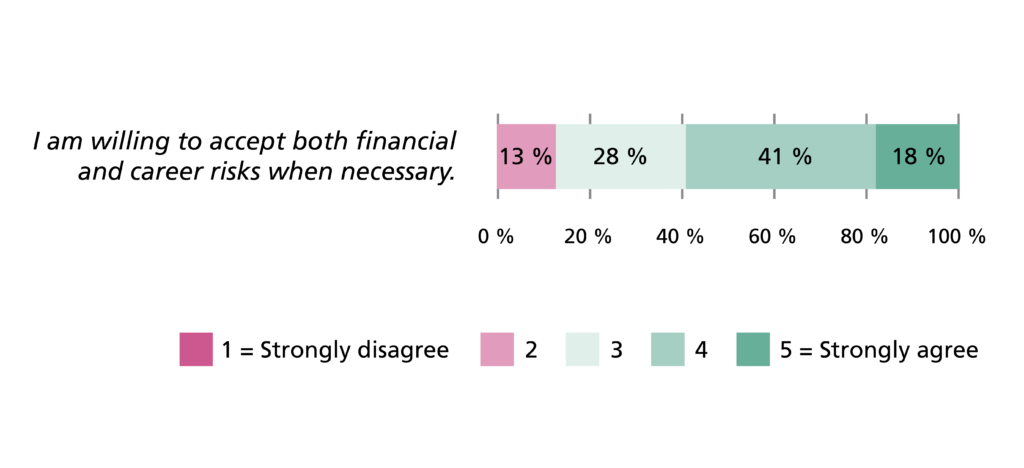
Sacrifices employment benefits
It is not self-evident that an entrepreneur has a nice office, secretary, and other equipment unless he or she provides them for him- or herself. Even a regular salary may be uncertain. Almost four out of five students (77%) did not need all the fringe benefits that are provided by conventional employment. (Figure 7)
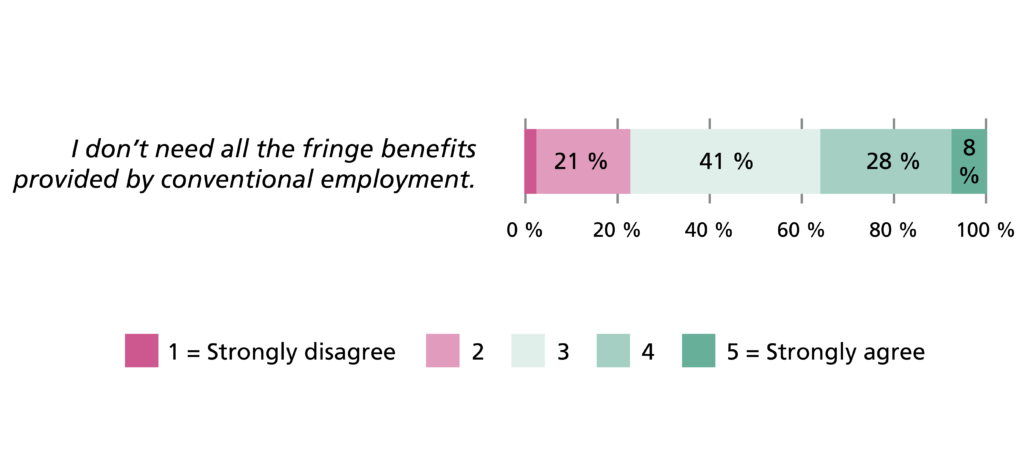
Need to achieve
Entrepreneurs have a robust need to strive and achieve their high-level objectives. Almost all students felt pride when completed a project successfully as 97% percent at least somewhat agreed on the statement. Over 90 percent (92%) had a strong desire to achieve positive results even when it requires a lot of additional work. (Figure 8)
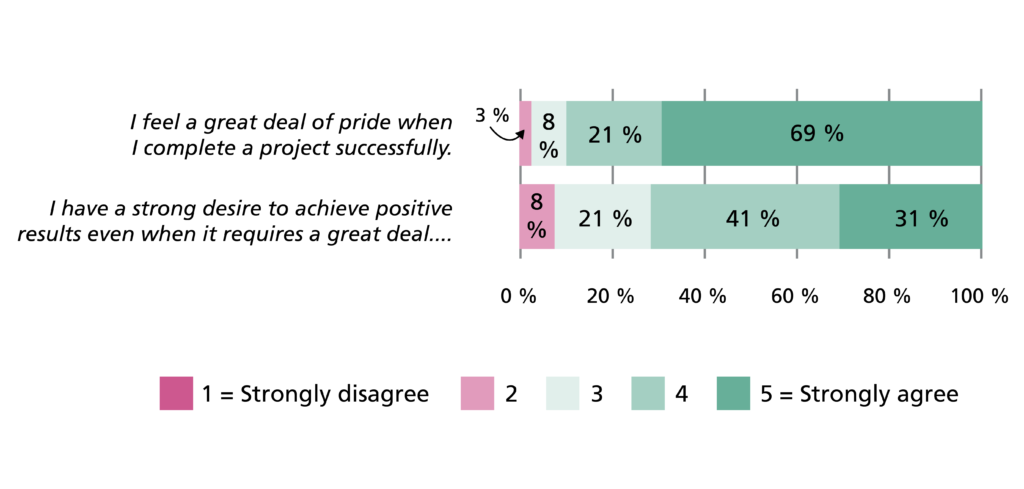
Business experience
Previous experience and entrepreneurial know-how are essential qualities that promote entrepreneurship. In addition, formal training, education and general management experience are beneficial to a successful entrepreneur. Four out of five students (80%) felt they have a good understanding of how to manage a business. While a fifth (20%) felt that, they do not have a good understanding of managing a business. (Figure 9)
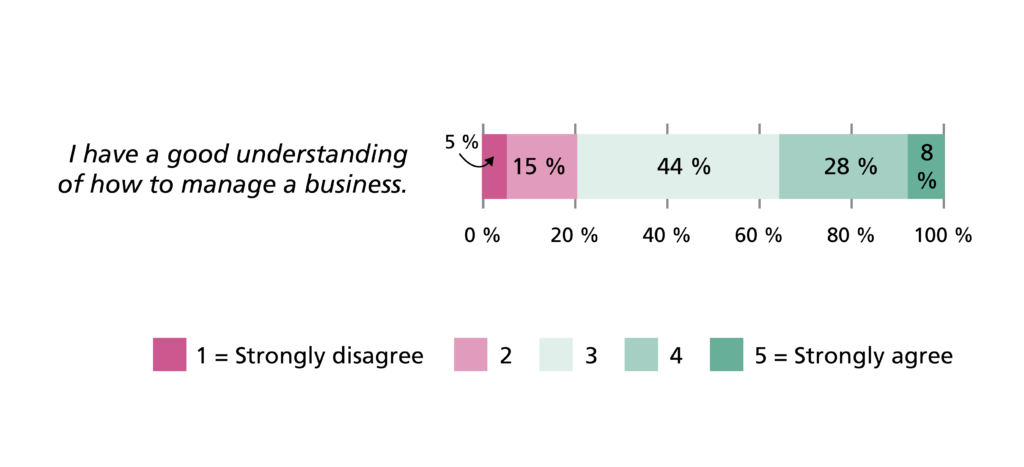
Independent
As an entrepreneur, you must be able to work independently and responsibly. Nearly all, 95 percent of the students, enjoyed controlling and affecting their own work. The percentage of those capable of taking responsibility was 10 percentage points lower: 85 percent of students wanted to take responsibility for their work’s successes and failures. No one completely disagreed with these two statements. (Figure 10)
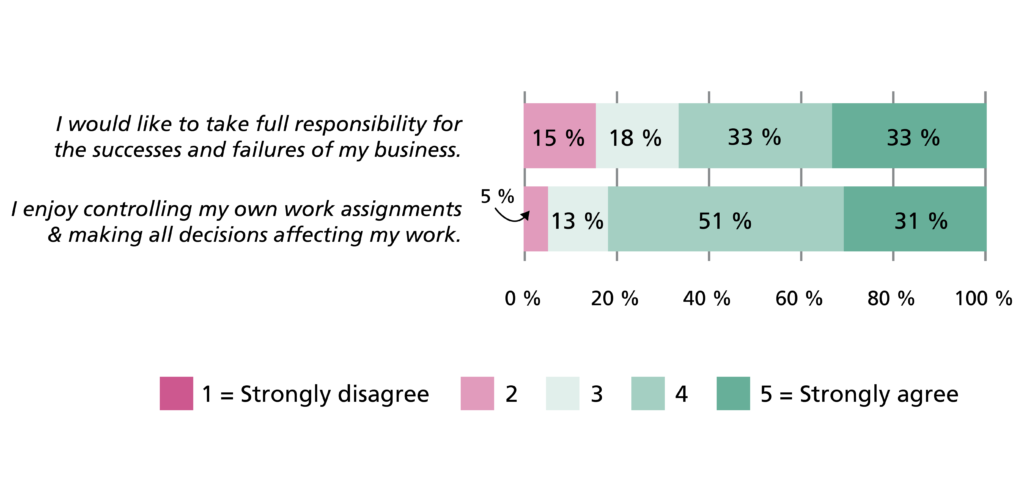
Self-employed parent as a role model
Studies show that one of the most important factors affecting entrepreneurship is the entrepreneurial background of parents. In addition, the change of ownership of the company in the family circle or between close relatives is a logical route to entrepreneurship. More than half of the students had parents with an entrepreneurial background, whose experiences and know-how can be easily passed on to their children. (Figure 11)
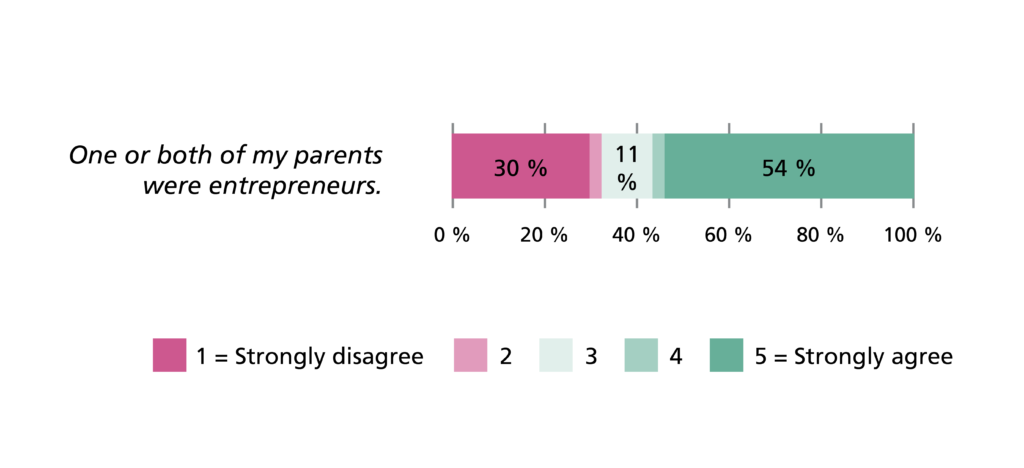
Integrity
Integrity is one of the most important features of entrepreneurial success. All the students participating in the study felt that other people consider them honest and reliable as all at least agreed on the statement. (Figure 12)
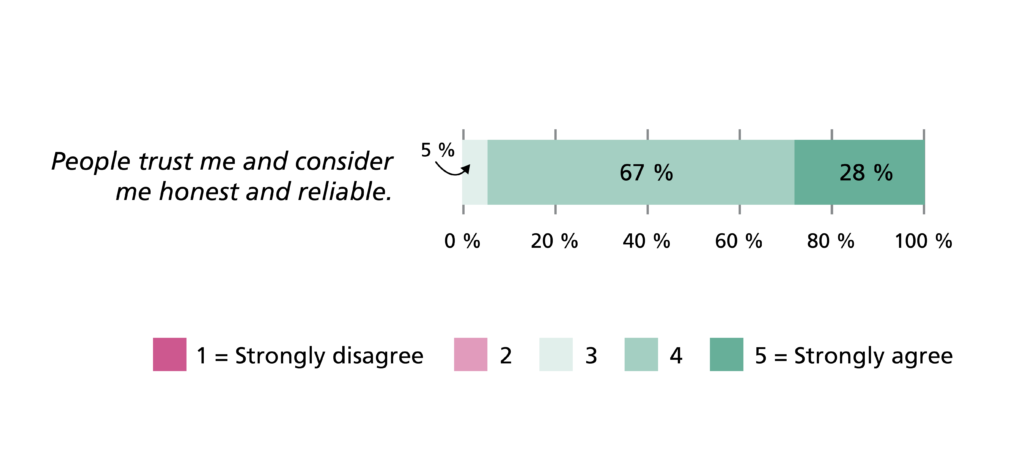
Determination
Entrepreneurs must be able to complete complex projects. As many as 92 percent of the students felt that they were tenacious and are trying to complete even difficult projects. Similarly, only 8 percent were more or less donors. (Figure 13)
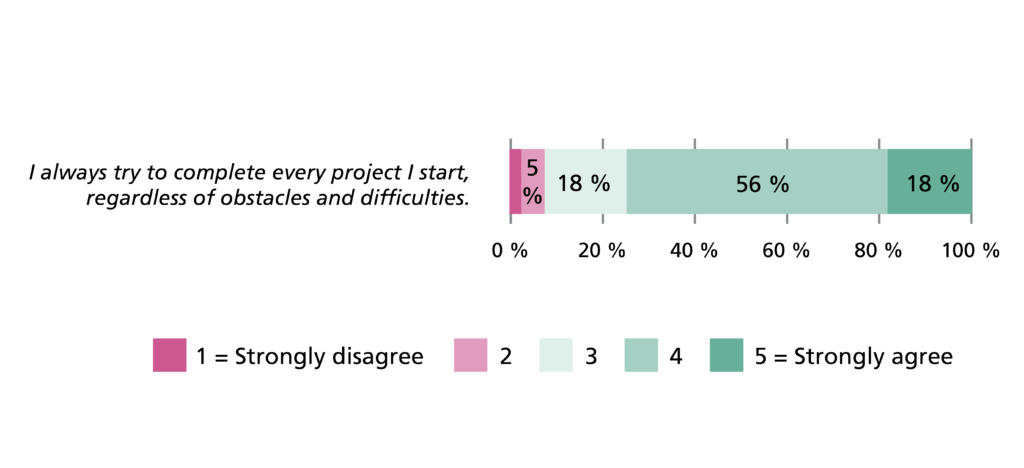
Adapts to change
There were two skills on the quiz to measure adaptation to a change: the capacity to function in ambiguous situations, and the ability to make quick decisions. Majority of the students (90%) felt at least somewhat capable of functioning in ambiguous situations. About one-fifth (22%) did not feel that they are quick decision-makers. (Figure 14)
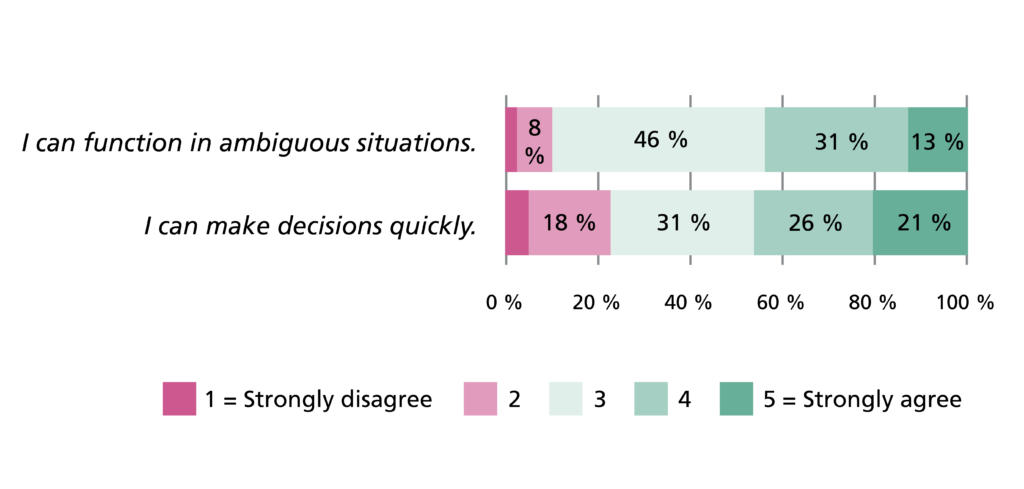
Good network of professionals
An entrepreneur should have a wide network of friends and professionals to turn for advice and information. Only 11 percent somewhat disagreed with having good network, while 18 percent strongly agreed with the statement. (Figure 15)
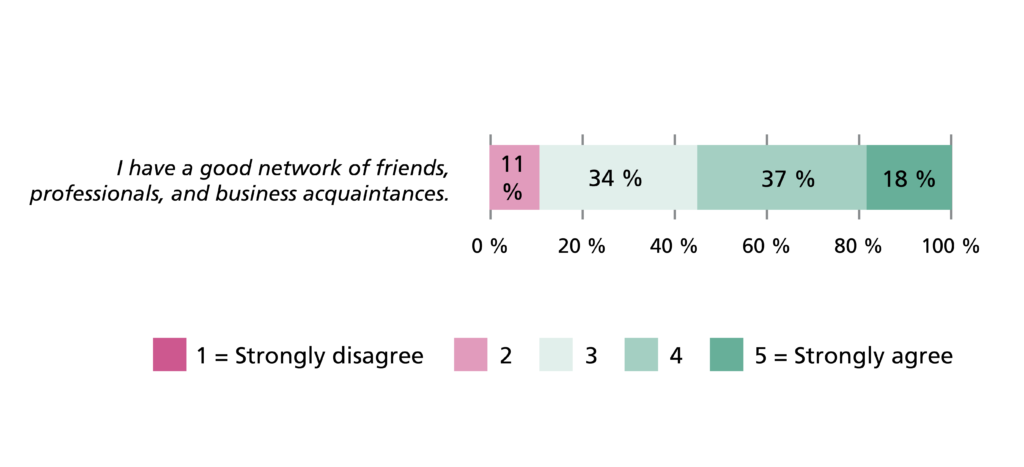
Ability to be an entrepreneur
The Likert-scale responses were summed up, yielding a summary score measuring the students’ ability to be an entrepreneur. Vast majority of the students (92%) had at least satisfactory ability to become an entrepreneur, from which the quarter of the students (26%) had an outstanding ability. None of the students gained the score 0 – 39 meaning “You should probably avoid entrepreneurship”. (Figure 16)
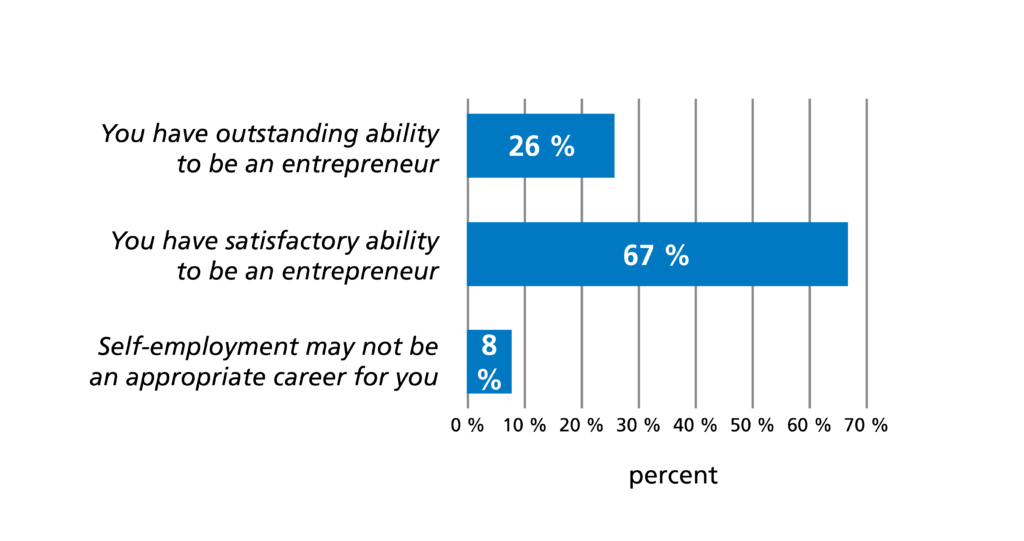
The ability to be an entrepreneur correlated most strongly with how self-confident and how willing the student was to take responsibility for his or hers own successes and failures (App 1; r = 0,6). Furthermore, the business experience and the supporting network increased one’s ability to become an entrepreneur (App 1; r = 0,6).
2.4 Country based findings
Country-specific differences should be taken with scepticism, since there were only few representatives of some nationalities. However, this chapter presents the results that the non-parametric Kruskal-Wallis test found to be significant.
Adapts to change
Quick decision-making skills deviated among the students: students from Poland, Finland, and India felt that they can make decisions quickly, compared with students from Belgium, Netherlands and Germany who identified their capability in quick decision-making more negatively. (App 2; Figure 17)
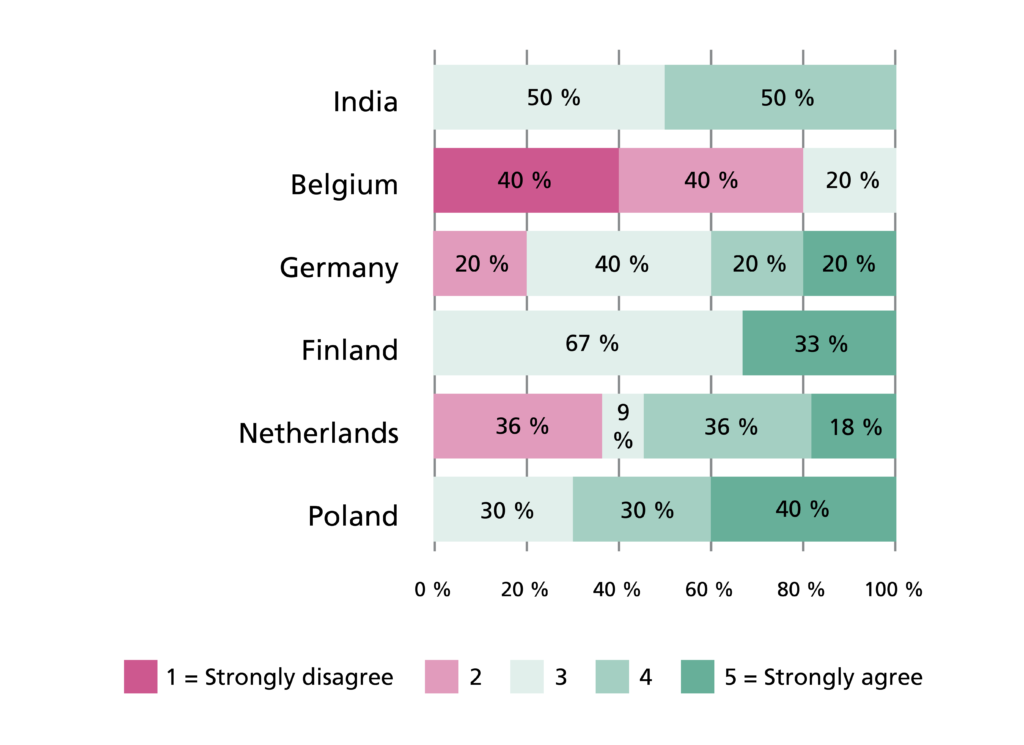
Good network of professionals
Students from Poland, Finland and Germany had the best network of friends, professionals and business acquaintances, while portion of students from India (50%), Belgium (20%) and Netherlands (18%) disagreed with the statement. (App 2; Figure 18)
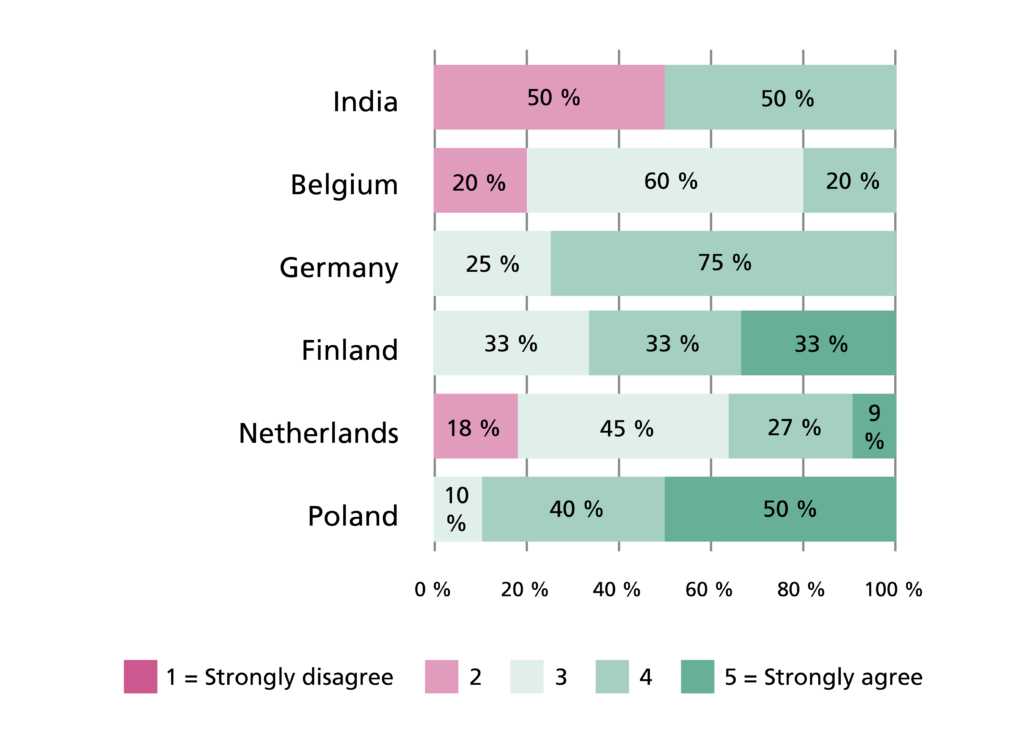
Ability to be an entrepreneur
Students from India, Poland, Finland and Germany were the most capable of becoming an entrepreneur. For one-fifth of the Belgium students (20%) self-employment was not an appropriate career. In addition, self-employment was not a clear option for Dutch students. (App 2; Figure 19)
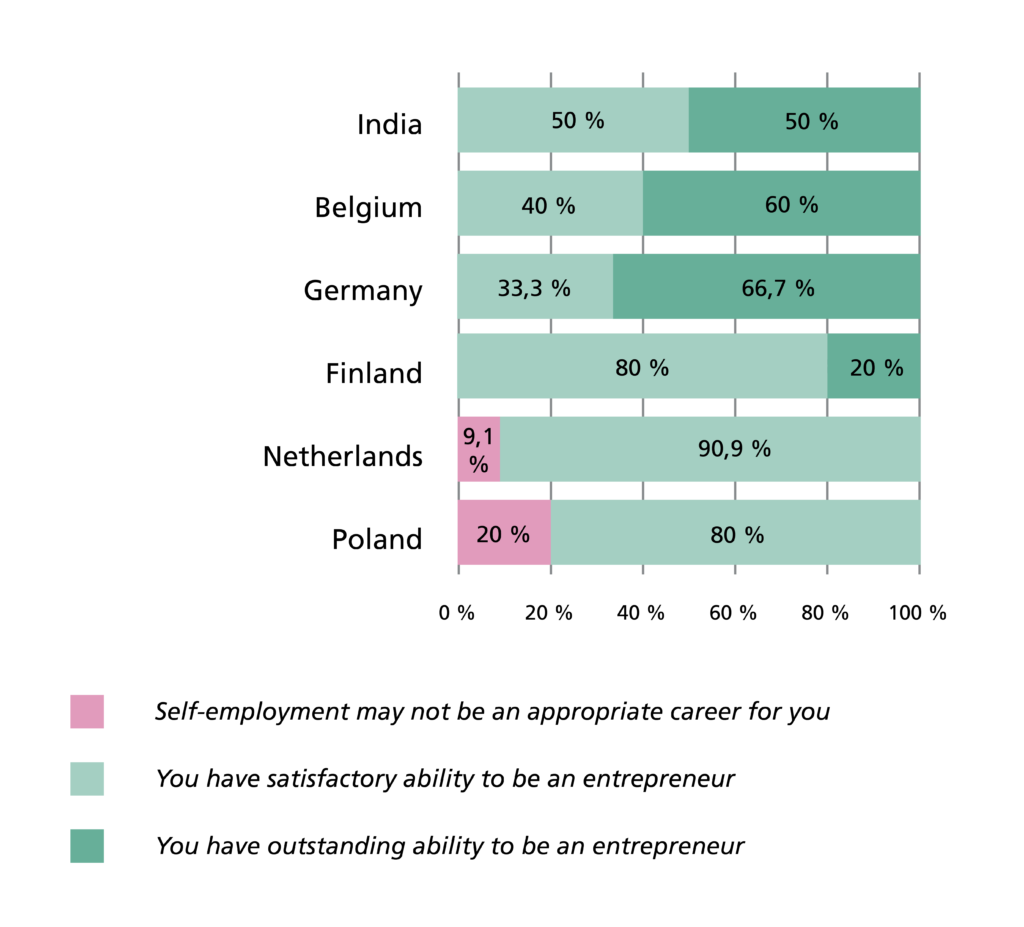
3. Discussion and Conclusion
The aim of this paper was to explore how students evaluate their entrepreneurial skills. Using a self-assessment form developed by the Women’s Initiative for Self-Employment, we therefore conducted an empirical study among 39 students from six different countries.
We find that the students in our sample rated themselves very positively with regard to the different characteristics of an entrepreneur, resulting in 92% of them having at least satisfactory ability to become an entrepreneur. There might be several explanations for this: First, our respondents participated in the survey during an International Week on Service Design where an entrepreneurial mindset was actively encouraged and trained. This might have influenced their self-perception. It would be interesting to compare their results to students that never took part in such a program or training. Second, even though we asked the students to answer the questions honestly, it cannot be precluded that some have made too positive assessments or have shown socially desirable response behaviour.
It is interesting to note that results differ between the nationalities: While students from India, Poland, Finland and Germany all have satisfactory or even outstanding ability to become an entrepreneur, for 20% of the Belgian and 9% of the Dutch students self-employment might not be an appropriate career. Moreover, we find self-confidence and willingness to take responsibility for his/her own successes and failures to be most strongly correlated with the ability to become an entrepreneur. Even though the influencing factors and the total score for entrepreneurial mindset are not independent, the correlations still tell, which specific factors are the most aligned with the total score.
Our results on how the surveyed students evaluate their entrepreneurial skills and how these results differ (e.g. between students from different countries), is of great practical relevance to us as their professors and mentors in particular and their home institutions in general. Based on these results, we can encourage them individually by offering them tailored opportunities to grow their personality, entrepreneurial mindset and to start their own business. Results indicate, e.g., that with regard to the Belgian, Indian and Dutch students, we should focus on helping them grow their network, while for Belgian, Dutch and German students it would be beneficial for growing their entrepreneurial mindset to providing them with the skills and confidence that they are able to make quick decisions. Apart from that, due to the high scores it is not so much about further developing their entrepreneurial mindset but providing them with opportunities to apply this mindset and start a business. Here, their home universities can make a major contribution through actively promoting start-up programmes and funding opportunities.
We acknowledge that our study has several limitations: First, the small sample size is not sufficient to allow generalization. Moreover, the number of respondents from the different countries varied considerably, which might have influenced the results. However, we believe that our research leads to some first insightful exploratory results that are of value for both theory and practice and we would appreciate further research in this area: First, subsequent work could test the robustness of our findings by applying the questionnaire to a larger number of respondents. Furthermore, it would be of great interest to further investigate differences between the nationalities in this study and to enlarge it to further countries of interest. Also, subsequent research could assess if the field of study of the students has an impact on their entrepreneurial mindset.
References
- Bock, S. (2020). Entrepreneurial self-assessment survey. https://susanbock.com/wp-content/uploads/2018/10/Entrepreneurial-Self-Assessment.pdf
- Gargouri, C., & Naatus, M. K. (2019). Building entrepreneurial mindset in the classroom. Journal of Entrepreneurship Education, 22(3). https://www.abacademies.org/articles/building-entrepreneurial-mindsets-in-the-classroom-8232.html
- Guth, D. J. (2016). Creating an entrepreneurial mindset. Community College Journal, 87(2), 26–31.
- Herrmann, K., Hannon, P., Cox, J., Ternouth, P., & Crowley, T. (2008). Developing entrepreneurial graduates: Putting entrepreneurship at the centre of higher education [report]. CIHE, NCGE and NESTA. https://ncee.org.uk/wp-content/uploads/2018/01/developing_entrepreneurial_graduates.1.pdf
- Li, C. Q., Harichandran, R. S., Carnasciali, M. I., Erdil, N. O., & Nocito-Gobel, J. (2016). Development of an Instrument to Measure the Entrepreneurial Mindset of Engineering Students. ASEE Annual Conference, New Orleans, Louisiana, June 26–29, 2016. https://peer.asee.org/26819
- Lindberg, E., Bohman, H., Hulten, P., & Wilson, T. (2017). Enhancing students’ entrepreneurial mindset: a Swedish experience. Education + Training, 59(7/8), 768–779. https://doi.org/10.1108/ET-09-2016-0140
- Rahayu, A. Y. S. & Fitriati, R. (2013). Change in Student Mindset Toward Entrepreneur an Action Research. International Journal of Administrative Science & Organization, 20(2), 98–105. https://scholarhub.ui.ac.id/jbb/vol20/iss2/6/
Appendix
| Spearman’s rho | Score | |
| I am willing to work 50 hours or more per week regularly. | Correlation Coefficient | 0,191 |
| Sig. (2-tailed) | 0,244 | |
| My family will support my going into business. | Correlation Coefficient | .360* |
| Sig. (2-tailed) | 0,024 | |
| I am willing to accept both financial and career risks when necessary. | Correlation Coefficient | .623** |
| Sig. (2-tailed) | 0,000 | |
| I don’t need all the fringe benefits provided by conventional employment. | Correlation Coefficient | 0,283 |
| Sig. (2-tailed) | 0,081 | |
| I would like to take full responsibility for the successes and failures of my business. | Correlation Coefficient | .487** |
| Sig. (2-tailed) | 0,002 | |
| I would experience more financial success by operating my own business. | Correlation Coefficient | .359* |
| Sig. (2-tailed) | 0,025 | |
| I feel a great deal of pride when I complete a project successfully. | Correlation Coefficient | .389* |
| Sig. (2-tailed) | 0,014 | |
| I have a high energy level that can be maintained over a long time. | Correlation Coefficient | .487** |
| Sig. (2-tailed) | 0,002 | |
| I enjoy controlling my own work assignments & making all decisions affecting my work. | Correlation Coefficient | .514** |
| Sig. (2-tailed) | 0,001 | |
| I believe that I am primarily responsible for my own successes and failres. | Correlation Coefficient | .647** |
| Sig. (2-tailed) | 0,000 | |
| I have a strong desire to achieve positive results even when it requires a great deal of additional effort. | Correlation Coefficient | .610** |
| Sig. (2-tailed) | 0,000 | |
| I have a good understanding of how to manage a business. | Correlation Coefficient | .602** |
| Sig. (2-tailed) | 0,000 | |
| I can function in ambiguous situations. | Correlation Coefficient | 0,297 |
| Sig. (2-tailed) | 0,066 | |
| One or both of my parents were entrepreneurs. | Correlation Coefficient | .502** |
| Sig. (2-tailed) | 0,002 | |
| I believe that my abilities and skills are greater than those of most of my coworkers. | Correlation Coefficient | 0,242 |
| Sig. (2-tailed) | 0,138 | |
| People trust me and consider me honest and reliable. | Correlation Coefficient | 0,141 |
| Sig. (2-tailed) | 0,392 | |
| I always try to complete every project I start, regardless of obstacles and difficulties. | Correlation Coefficient | .403* |
| Sig. (2-tailed) | 0,011 | |
| I am willing to do something even when other people laugh or belittle me for doing it. | Correlation Coefficient | .620** |
| Sig. (2-tailed) | 0,000 | |
| I can make decisions quickly. | Correlation Coefficient | .494** |
| Sig. (2-tailed) | 0,001 | |
| I have a good network of friends, professionals, and business acquaintances. | Correlation Coefficient | .596** |
| Sig. (2-tailed) | 0,000 |
| Country | Minimum | Maximum | Mean | Median | Std. Deviation |
| India | 75 | 89 | 82,0 | 82,0 | 9,9 |
| Poland | 69 | 90 | 79,1 | 80,0 | 6,2 |
| Finland | 65 | 87 | 77,3 | 80,0 | 11,2 |
| Germany | 69 | 88 | 74,8 | 72,0 | 7,5 |
| Netherlands | 48 | 78 | 68,1 | 67,0 | 8,7 |
| Belgium | 56 | 72 | 66,0 | 69,0 | 6,8 |
| Total | 48 | 90 | 73,3 | 72,5 | 9,2 |
| Null Hypothesis | Test | Sig. | Decision | |
| 1 | The distribution of ‘I can make decisions quickly.’ is the same across categories of Country. | Independent-Samples Kruskal-Wallis Test | ,048 | Reject the null hypothesis. |
| 2 | The distribution of ‘I have a good network of friends, professionals, and business acquaintances.‘ is the same across categories of Country. | Independent-Samples Kruskal-Wallis Test | ,034 | Reject the null hypothesis. |
| 3 | The distribution of Sum score is the same across categories of Country. | Independent-Samples Kruskal-Wallis Test | ,013 | Reject the null hypothesis. |
Asymptotic significances are displayed. The significance level is ,05.
